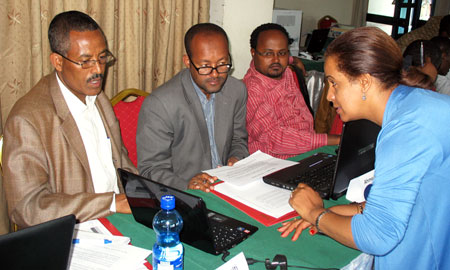The Health Policy Project ended in 2016. Work continued under Health Policy Plus (HP+) until 2022.
NEWS & VIEWS
Posted August 30, 2012
 |
Photo: Health Policy Project Ethiopia's senior technical advisor Senait Tibebu (right), USAID/Ethiopia's Gebeyew Alti (left), and workshop participants examine how the software models analyze the impact of investments in health programs and increase the ability to project the need for family planning and reproductive health, maternal health, and HIV services. Photo by Rudolph Chandler/Health Policy Project |
ADDIS ABABA--The Ethiopian Public Health Association (EPHA)—the leading association of public health professionals in the Ethiopia—and the Health Policy Project (HPP) partnered this month to conduct a workshop on applying data from modeling systems to evidence-based decision making and advocacy for increased resources to improve health. Data and correct evidence are essential in helping decisionmakers and national health planning bodies craft effective health policies that address the needs of their constituents.
Twenty-five individuals from the Federal Ministry of Health, Ethiopian Health and Research Institute, the Population Affairs Directorate in the Ministry of Finance and Economic Development, the Central Statistical Agency, and other research and university partners participated in the workshop. Participants learned how to use HPP software models and tools, including the Spectrum suite of models, RAPID (which projects the social and economic effects of rapid population growth to raise awareness about the impacts on a country’s health, education, land use, and economy), the GAP Tool, and OneHealth. These tools provide users with national-level demographic data to help them analyze the impact of investments in health programs and increase their ability to project the need for family planning and reproductive health, maternal health, and HIV services and to estimate costs associated with them.
Spectrum is currently used by population departments at both Gondar University and Addis Ababa University. This training helped to build a strong foundation in the use of models for population projections and incorporate this information in health and population planning. A representative from one of HPP’s partners shared his views on the training:
“We were very enthusiastic to get the training on the Spectrum model. It was really a golden opportunity for us to explore fresh knowledge and acquire the essential skills that will empower us to stand confidently before our students in the university and transfer to them this knowledge.”
—Mr. Nega Mihret, Head, Department of Population Studies, Gondar University
The workshop also enhanced the participants’ skills to advocate for crucial health programs and services that help improve the health of people in Ethiopia. Following this training, HPP will identify up to 10 participants and closely mentor them to serve as master trainers in future use of the tools and other resources. Additional regional trainings will be held in the coming years. HPP will continue to work with EPHA in building the capacity of health officials and researchers to use software models and tools to support Ethiopia’s efforts to enhance access to health services.
View photos from the workshop
Read more about Health Policy Project software models and tools
What's New
- Something to Build On: “Innovation Exchange” Celebrates the Health Policy Project’s Close and a New Beginning
- What Will it Take for Tanzania to Achieve ART Targets and Ensure Long-Term Sustainability of the HIV Response?
- Helping Kenya’s County Leaders Advocate for Increased Health Investments
- HPP Holds Working Meeting on Ensuring Responsible PEPFAR Transitions for Key Populations
- Health Policy Project Celebrates 2016 International Women's Day
- HPP Staff Participate in White House Conference on HIV Stigma Reduction

